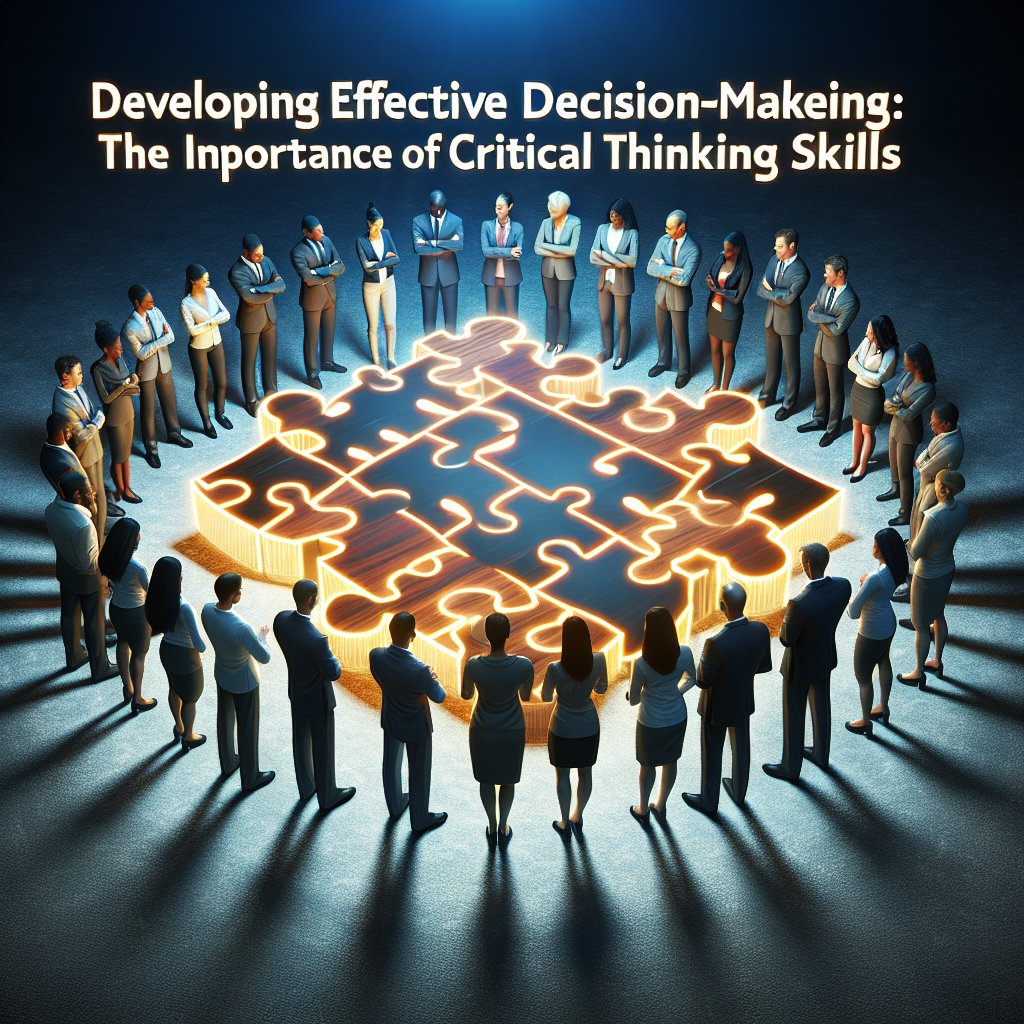In today’s fast-paced and ever-changing world, making effective decisions is crucial to success in both personal and professional settings. Whether you are faced with choosing a career path, deciding on a major life change, or making a business decision, having strong critical thinking skills is essential. These skills will help you analyze information, assess the situation, and make well-thought-out decisions that align with your goals and values.
One of the key components of effective decision-making is critical thinking. Critical thinking is the process of assessing information, evaluating arguments, and making informed decisions. It involves being able to think logically, recognize assumptions, evaluate evidence, and consider alternative perspectives. Developing strong critical thinking skills can help you become a more effective problem solver, better communicator, and more confident decision-maker.
The Importance of Critical Thinking Skills in Decision-Making
Effective decision-making requires more than just having access to information. It requires the ability to analyze that information, synthesize it, and come to a reasoned conclusion. Critical thinking skills are essential in this process because they enable you to:
1. Evaluate information objectively: Critical thinking helps you assess information without bias or prejudice. By evaluating the evidence objectively, you can make more informed decisions that are based on facts rather than emotions or personal beliefs.
2. Identify assumptions: Critical thinking allows you to recognize the assumptions underlying arguments and claims. By questioning these assumptions, you can uncover potential flaws in reasoning and make more informed decisions.
3. Consider alternative perspectives: Critical thinking involves considering multiple viewpoints and alternative explanations. By exploring different perspectives, you can gain a broader understanding of the issue at hand and make more well-rounded decisions.
4. Analyze arguments: Critical thinking helps you analyze the strength and weakness of arguments. By examining the evidence, logic, and reasoning behind an argument, you can determine its validity and make more informed decisions.
5. Problem-solving: Critical thinking skills are essential for effective problem-solving. By breaking down complex issues into smaller components, identifying patterns, and drawing connections, you can develop creative solutions to challenges.
Developing Effective Critical Thinking Skills
Developing strong critical thinking skills takes time and practice. Here are some strategies to help you enhance your critical thinking abilities:
1. Ask questions: One of the key components of critical thinking is asking questions. By questioning assumptions, seeking clarification, and exploring alternative viewpoints, you can deepen your understanding of an issue and make more informed decisions.
2. Seek out diverse perspectives: To develop strong critical thinking skills, it’s essential to expose yourself to different viewpoints and experiences. Engage in conversations with people who have different opinions, read a variety of sources, and consider alternative perspectives to broaden your understanding.
3. Evaluate evidence: Critical thinking involves assessing the evidence supporting an argument. Take the time to evaluate the information you encounter, consider the source, and determine its reliability and relevance to the issue at hand.
4. Practice active listening: Effective critical thinking requires active listening. By listening attentively to others’ perspectives, asking clarifying questions, and seeking to understand their reasoning, you can develop a more comprehensive understanding of an issue.
5. Reflect on your thinking: Regularly reflect on your thinking process to identify areas for improvement. Consider how you approach problems, evaluate evidence, and make decisions, and look for ways to enhance your critical thinking skills.
FAQs:
Q: How can critical thinking skills benefit me in my personal life?
A: Critical thinking skills can help you make more informed decisions in your personal life, whether you’re choosing a career path, making a major purchase, or navigating a difficult relationship. By developing strong critical thinking skills, you can analyze information, evaluate arguments, and make decisions that align with your values and goals.
Q: Can critical thinking skills be learned or are they innate?
A: While some people may have a natural inclination towards critical thinking, these skills can be developed and honed through practice. By actively engaging in critical thinking exercises, seeking out diverse perspectives, and reflecting on your thinking process, you can enhance your critical thinking abilities over time.
Q: How can I incorporate critical thinking skills into my daily routine?
A: To incorporate critical thinking skills into your daily routine, consider how you approach problems, evaluate information, and make decisions. Practice asking questions, seeking out diverse perspectives, and evaluating evidence in your day-to-day activities to strengthen your critical thinking abilities.
Q: How can critical thinking skills benefit me in the workplace?
A: Critical thinking skills are highly valued in the workplace as they enable you to solve complex problems, make informed decisions, and communicate effectively with colleagues. By developing strong critical thinking skills, you can enhance your performance, contribute to innovative solutions, and advance your career.
Q: What are some common obstacles to effective critical thinking?
A: Common obstacles to effective critical thinking include biases, assumptions, and emotional reactions. By being aware of these obstacles and actively working to overcome them, you can improve your critical thinking skills and make more informed decisions.
In conclusion, developing effective decision-making requires strong critical thinking skills. By honing your ability to evaluate information, consider alternative perspectives, and analyze arguments, you can make more informed decisions that align with your goals and values. Incorporating critical thinking skills into your daily routine, seeking out diverse perspectives, and reflecting on your thinking process can help you become a more confident and effective decision-maker in both personal and professional settings.





Leave A Comment